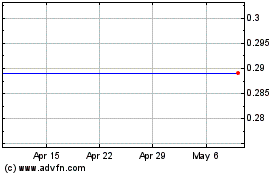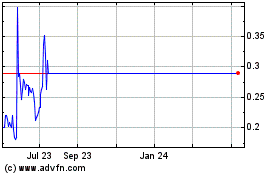Aridis Pharmaceuticals, Inc. (Nasdaq: ARDS) today announced
preliminary top-line results from the randomized, double blinded,
placebo-controlled Phase 2a study of AR-501, which evaluated the
safety and pharmacokinetics of three ascending doses of AR-501
administered as an inhaled aerosol in cystic fibrosis (CF) patients
with confirmed Pseudomonas aeruginosa bacterial and other potential
infections. The study was conducted with funding support from the
Cystic Fibrosis Foundation. AR-501 is being developed as a
once-per-week inhaled dosing regimen that is self-administered
using a commercially available nebulizer device.
Key findings:
- The study’s
primary and secondary endpoints of safety and pharmacokinetics (PK)
were met
- Three weekly
inhaled doses of AR-501 at 6.4mg, 20mg, and 40mg dose levels were
well tolerated in CF patients. No drug related serious adverse
events (SAEs) were observed. The majority of treatment emergent
adverse events (TEAEs) were respiratory in nature and mostly mild
to moderate in severity
- CF patients
achieved high uptake of AR-501 in the respiratory tract, as
measured by sputum concentrations, at levels that were more than
50-fold higher than required for inhibition of the target bacteria
P. aeruginosa
- Inhaled delivery
achieved more than 10-fold higher respiratory uptake of gallium
(AR-501) than past clinical studies of intravenous (IV) gallium
which resulted in lung function improvement and P. aeruginosa
reduction.
"We are very pleased to see the safety and
tolerability that we had observed in healthy volunteers also
confirmed in CF patients,” said Hasan Jafri, MD, Aridis’ Chief
Medical Officer. “The high drug level achieved in the lungs along
with low systemic exposure from inhaled delivery effectively
overcome the limitations of conventional intravenous delivery, and
provide a strong basis for a large efficacy study in CF and other
lung infections.”
“The data from this study are encouraging and
the results align with the expectations for the outcomes in safety
and bioavailability. These data certainly warrant the continued
evaluation of this drug in CF patients,” said Dr. Noah Lechtzin,
the study’s lead principal clinical investigator, Director of the
Adult Cystic Fibrosis Program and Associate Professor of Medicine
at Johns Hopkins University.
The study was primarily designed as a safety and
PK trial in clinically stable cystic fibrosis subjects and due to
the heterogeneity of concurrent medicine use (CFTR channel
modulators and antibiotics) in the study subjects, exploratory
objectives, such as microbiological burden of P. aeruginosa and
lung function (FEV1), were not established in this study.
“Having met the primary and secondary endpoints
of this study, we thank the Cystic Fibrosis Foundation for the
tremendous support they’ve provided to help us complete this study”
said Aridis’ CEO Vu Truong, PhD. “The attractive
safety profile of AR-501, combined with the recent results from our
AR-301 mAb Phase 3 program in older adults with ventilator
associated pneumonia provide Aridis with two promising
first-in-class, novel anti-infectives. We look forward to
discussing the results from these two programs with the US Food and
Drug Administration (FDA) and the European Medicines Agency (EMA)
to plan the definitive next study for each program to support the
filing of a license application.”
About AR-501 Phase 2a
The Phase 2a study of AR-501 enrolled 42 adults,
ages 18–80, with CF and confirmed P. aeruginosa bacterial
colonization to evaluate the safety and pharmacological properties
of three (3) weekly doses of AR-501 administered as a liquid
aerosol at 6.4mg (low dose cohort), 20mg (mid dose cohort), and
40mg (high dose cohort). Dose related increase in blood serum level
of gallium was observed, reaching 0.6ug/mL AR-501 after the third
inhaled dose at day 14 for the high dose cohort. Sputum levels of
gallium, a surrogate for level in lung fluids, were well over 50
ug/mL, which is greater than 50-fold required to inhibit P.
aeruginosa. Prior Phase 1 & 2 studies of 5-day continuous
intravenous (IV) infusion of gallium resulted in statistically
significant lung function improvements and reductions of P.
aeruginosa in CF patients, despite low sputum uptake (~1ug/mL) and
high blood serum exposures (2-3 ug/mL) [see Goss, CH et al. Sci
Transl Med. 2018 September 26; 10(460).
doi:10.1126/scitranslmed.aat7520]. The current pharmacokinetics
data of inhaled delivery showed >10-fold higher respiratory
uptake of gallium (AR-501) and ~5-fold lower blood serum exposure
as compared to IV delivery.
Inhaled AR-501 was found to be well tolerated.
The majority of adverse events (AEs) were non-serious and deemed
not related to the study drug by the blinded study investigator.
Most AEs were Grade 1 or Grade 2 in severity. Most common treatment
emergent adverse events (TEAEs) were respiratory in nature (e.g.,
cough, throat irritation), with one Grade 3 TEAE of dry throat and
cough that occurred in the first of the 3 inhaled doses. An
independent data and safety monitoring board (DSMB) consisting of
CF physicians has reviewed the safety data and authorized the
escalation to the 80 mg (highest) dose cohort. Aridis received
approval by the FDA and support from the CF Foundation to continue
the study with the 80mg cohort to explore the drug candidate’s
potential at a higher dose. Data from the highest cohort are
expected in the second half of 2023.
AR-501’s once weekly inhaled formulation of
gallium, given in either a single ascending dose or a multiple
ascending dose regimen (5 weekly doses), was found to be safe
and well-tolerated in 48 healthy adults participating in the
Phase 1 part of Aridis’ Phase 1/2a study (NCT03669614).
AR-501 has received Orphan Drug designation in
the US and in Europe, Fast Track and Qualified Infectious Diseases
Product (QIDP) designations from the US FDA as a potential
treatment of CF-related lung infections.
About AR-501 and Cystic Fibrosis
AR-501 is an inhaled formulation of gallium
citrate that is being developed to treat chronic lung infections in
cystic fibrosis patients. It is a non-antibiotic, broad acting
antimicrobial with a mechanism of action involving interference
with iron acquisition in microbes and disruption of microbial
iron-dependent metabolic pathways distinct from current
antibiotics. AR-501 acts as an iron analog and is believed to
disrupt multiple iron dependent pathways in microbes, leading to
growth inhibition. AR-501 has antimicrobial activities against a
number of gram-negative and gram-positive bacteria, including
antibiotic resistant strains. Preclinical efficacy and safety data
have demonstrated that AR-501 works synergistically with multiple
antibiotics, is effective against antibiotic resistant strains, and
has a low intrinsic resistance profile.
Cystic fibrosis patients often suffer from
severe, persistent secondary bacterial lung infections due to their
underlying lung disease which results in an immune-compromised
state. Current standard of care antibiotics approved for lung
infections in cystic fibrosis patients are inhaled tobramycin
(TOBI®) and inhaled aztreonam (Cayston®). Both are administered
daily 2 to 3 times per day. AR-501 is being developed as a
self-administered, inhaled once-a-week treatment. Separately, an
intravenous (IV) formulation of gallium nitrate citrate has been
evaluated in Phase 1 and Phase 2 clinical studies as a single,
5-day infusion in moderate and severe cystic fibrosis patients by
researchers at the University of Washington (Seattle, WA). Both
clinical studies of IV gallium demonstrated safety and efficacy as
measured by improvement in lung function.
About Aridis Pharmaceuticals, Inc.
Aridis Pharmaceuticals, Inc. discovers and
develops anti-infectives to be used as add-on treatments to
standard-of-care antibiotics.
The Company is advancing multiple clinical stage
mAbs targeting bacteria that cause life-threatening infections such
as ventilator associated pneumonia (VAP) and hospital acquired
pneumonia (HAP), in addition to preclinical stage antiviral mAbs.
The use of mAbs as anti-infective treatments represents an
innovative therapeutic approach that harnesses the human immune
system to fight infections and is designed to overcome the
deficiencies associated with the current standard of care which is
broad spectrum antibiotics. Such deficiencies include, but are not
limited to, increasing drug resistance, short duration of efficacy,
disruption of the normal flora of the human microbiome and lack of
differentiation among current treatments. The mAb portfolio is
complemented by a non-antibiotic novel mechanism small molecule
anti-infective candidate being developed to treat lung infections
in cystic fibrosis patients. The Company’s pipeline is highlighted
below:
Aridis' Pipeline
AR-301 (VAP). AR-301
is a fully human IgG1 mAb targeting
gram-positive Staphylococcus aureus (S.
aureus) alpha-toxin that has recently completed the first of
two planned Phase 3 superiority clinical studies as an adjunctive
treatment of S. aureus ventilator associated pneumonia
(VAP).AR-320 (VAP). AR-320 is a fully
human IgG1 mAb targeting S. aureus alpha-toxin that is
being evaluated in a Phase 3 clinical study as a preventative
treatment of S. aureus colonized mechanically ventilated
patients who do not yet have
VAP.AR-501 (cystic fibrosis). AR-501 is
an inhaled formulation of gallium citrate with broad-spectrum
anti-infective activity being developed to treat chronic lung
infections in cystic fibrosis (CF) patients. This program is
currently in Phase 2a clinical development in CF
patients.AR-701 (COVID-19). AR-701 is a
cocktail of fully human mAbs discovered from convalescent COVID-19
patients that are directed at multiple protein epitopes on the
SARS-CoV-2 virus. It is formulated for delivery via intramuscular
injection or inhalation using a
nebulizer.AR-401 (blood stream
infections). AR-401 is a fully human mAb preclinical program
aimed at treating infections caused by
gram-negative Acinetobacter
baumannii.AR-101 (HAP). AR-101 is a
fully human immunoglobulin M, or IgM, mAb in Phase 2 clinical
development targeting Pseudomonas aeruginosa (P.
aeruginosa) liposaccharides serotype O11, which accounts for
approximately 22% of all P. aeruginosa hospital acquired
pneumonia cases worldwide.AR-201 (RSV
infection). AR-201 is a fully human IgG1 mAb out-licensed
preclinical program aimed at neutralizing diverse clinical isolates
of respiratory syncytial virus (RSV).
For additional information on Aridis
Pharmaceuticals, please visit https://aridispharma.com/.
Forward-Looking Statements
Certain statements in this press release are
forward-looking statements that involve a number of risks and
uncertainties. These statements may be identified by the use of
words such as "anticipate," "believe," "forecast," "estimated" and
"intend" or other similar terms or expressions that concern Aridis'
expectations, strategy, plans or intentions. These forward-looking
statements are based on Aridis' current expectations and actual
results could differ materially. There are a number of factors that
could cause actual events to differ materially from those indicated
by such forward-looking statements. These factors include, but are
not limited to, the need for additional financing, the timing of
regulatory submissions, Aridis' ability to obtain and maintain
regulatory approval of its existing product candidates and any
other product candidates it may develop, approvals for clinical
trials may be delayed or withheld by regulatory agencies, risks
relating to the timing and costs of clinical trials, risks
associated with obtaining funding from third parties, management
and employee operations and execution risks, loss of key personnel,
competition, risks related to market acceptance of products,
intellectual property risks, risks related to business
interruptions, including the outbreak of COVID-19 coronavirus,
which could seriously harm our financial condition and increase our
costs and expenses, risks associated with the uncertainty of future
financial results, Aridis' ability to attract collaborators and
partners and risks associated with Aridis' reliance on third party
organizations. While the list of factors presented here is
considered representative, no such list should be considered to be
a complete statement of all potential risks and uncertainties.
Unlisted factors may present significant additional obstacles to
the realization of forward-looking statements. Actual results could
differ materially from those described or implied by such
forward-looking statements as a result of various important
factors, including, without limitation, market conditions and the
factors described under the caption "Risk Factors" in Aridis' 10-K
for the year ended December 31, 2021 and Aridis' other filings made
with the Securities and Exchange Commission. Forward-looking
statements included herein are made as of the date hereof, and
Aridis does not undertake any obligation to update publicly such
statements to reflect subsequent events or circumstances.
Contact:Media Communications:Matt
SheldonRedChip Companies Inc.Matt@redchip.com1-917-280-7329
Investor RelationsDave GentryRedChip Companies
Inc.ARDS@redchip.com1-800-733-2447
SOURCE Aridis Pharmaceuticals, Inc.
Aridis Pharmaceuticals (NASDAQ:ARDS)
Historical Stock Chart
From Jan 2025 to Feb 2025

Aridis Pharmaceuticals (NASDAQ:ARDS)
Historical Stock Chart
From Feb 2024 to Feb 2025
